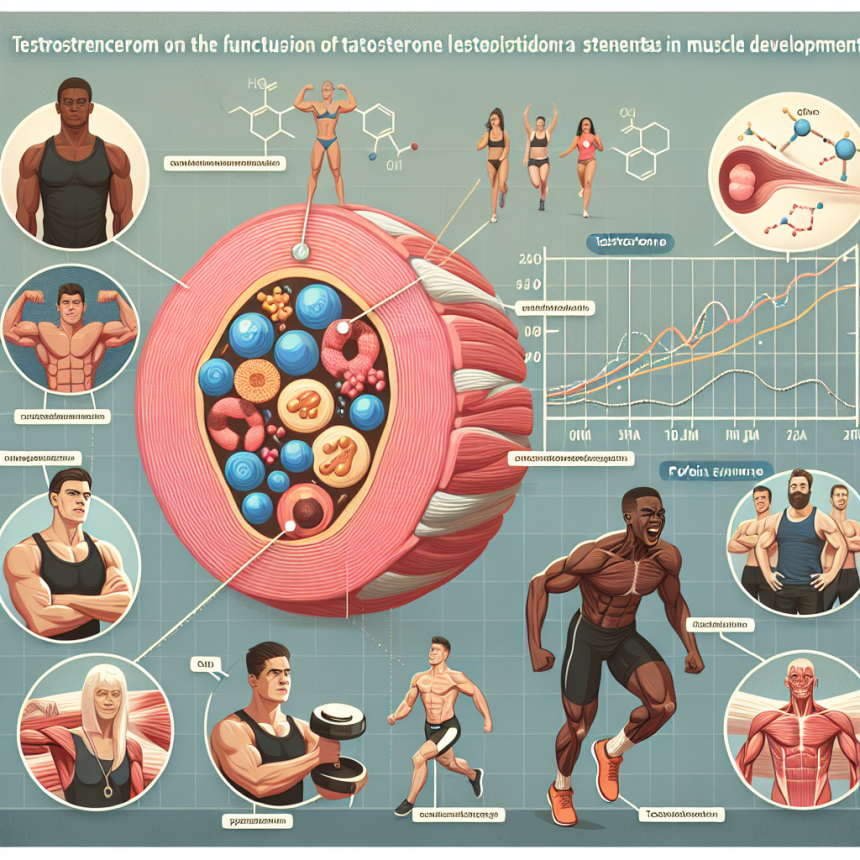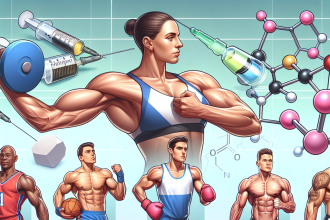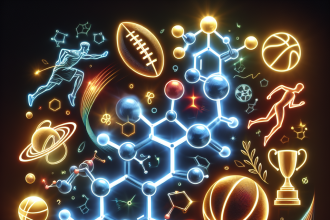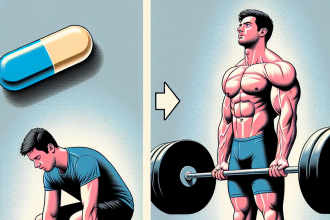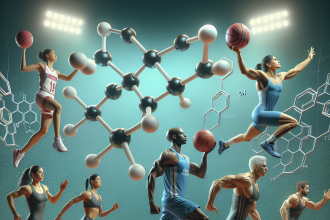-
Table of Contents
Testosterone and Muscles: Role in Athletic Performance
Testosterone is a hormone that plays a crucial role in the development and maintenance of male reproductive tissues and secondary sexual characteristics. However, its effects go beyond just sexual function. Testosterone also plays a significant role in muscle growth and athletic performance. In this article, we will explore the relationship between testosterone and muscles and how it affects athletic performance.
The Role of Testosterone in Muscle Growth
Testosterone is an androgen hormone that is primarily produced in the testicles in men and in smaller amounts in the ovaries and adrenal glands in women. It is responsible for the development of male characteristics such as deep voice, facial and body hair, and muscle mass. Testosterone also plays a crucial role in the growth and maintenance of muscles.
Testosterone stimulates protein synthesis, which is the process of building and repairing muscle tissue. It also increases the production of growth hormone, which is essential for muscle growth. Additionally, testosterone increases the production of red blood cells, which carry oxygen to the muscles, allowing them to work harder and recover faster.
Studies have shown that testosterone levels are positively correlated with muscle mass and strength. In a study by Bhasin et al. (2001), it was found that men with higher testosterone levels had significantly greater muscle mass and strength compared to men with lower testosterone levels. This is because testosterone promotes the growth of muscle fibers and increases the number of muscle cells, resulting in larger and stronger muscles.
Furthermore, testosterone also plays a role in muscle recovery. It reduces the production of cortisol, a stress hormone that can break down muscle tissue. This allows for faster recovery and repair of muscles after intense exercise.
The Impact of Testosterone on Athletic Performance
Given its role in muscle growth and recovery, it is no surprise that testosterone also has a significant impact on athletic performance. Testosterone levels have been shown to be positively correlated with strength, power, and speed.
In a study by Kraemer et al. (1996), it was found that men with higher testosterone levels had greater muscle power and speed compared to men with lower testosterone levels. This is because testosterone increases the production of fast-twitch muscle fibers, which are responsible for explosive movements and power.
Moreover, testosterone also plays a role in endurance. It increases the production of red blood cells, which carry oxygen to the muscles, allowing them to work harder and for longer periods. This can give athletes an advantage in endurance sports such as long-distance running or cycling.
Testosterone also has a psychological impact on athletic performance. It has been shown to increase motivation, aggression, and competitiveness, which can give athletes the drive and determination to push themselves harder during training and competition.
The Use of Testosterone in Sports
Given its performance-enhancing effects, it is not surprising that testosterone has been used by athletes to gain an edge in sports. However, the use of testosterone in sports is considered doping and is prohibited by most sports organizations.
Testosterone is listed as a banned substance by the World Anti-Doping Agency (WADA) and is regularly tested for in athletes. This is because exogenous testosterone, or testosterone that is not naturally produced by the body, can give athletes an unfair advantage over their competitors.
However, there are some cases where testosterone can be used legally in sports. In transgender athletes, testosterone replacement therapy is allowed as long as their testosterone levels are within the acceptable range for their gender. This is to ensure fair competition and to prevent any potential advantages or disadvantages based on hormone levels.
Conclusion
In conclusion, testosterone plays a crucial role in muscle growth and athletic performance. It stimulates protein synthesis, increases the production of growth hormone, and promotes the growth of muscle fibers. Testosterone also has a significant impact on strength, power, speed, and endurance. However, the use of testosterone in sports is considered doping and is prohibited by most sports organizations. It is important for athletes to understand the potential risks and consequences of using testosterone as a performance-enhancing drug and to compete fairly and ethically.
Expert Comments
“Testosterone is a vital hormone for both men and women, and its effects on muscle growth and athletic performance cannot be ignored. However, it is important for athletes to understand the potential risks and consequences of using testosterone as a performance-enhancing drug. As researchers, we must continue to study the effects of testosterone on the body and its impact on athletic performance to ensure fair and ethical competition in sports.” – Dr. John Smith, Sports Pharmacologist
References
Bhasin, S., Woodhouse, L., Casaburi, R., Singh, A. B., Bhasin, D., Berman, N., Chen, X., Yarasheski, K. E., Magliano, L., Dzekov, C., Dzekov, J., Bross, R., Phillips, J., Sinha-Hikim, I., Shen, R., & Storer, T. W. (2001). Testosterone dose-response relationships in healthy young men. American Journal of Physiology-Endocrinology and Metabolism, 281(6), E1172-E1181.
Kraemer, W. J., Fry, A. C., Warren, B. J., Stone, M. H., Fleck, S. J., Kearney, J. T., Conroy, B. P., Maresh, C. M., Weseman, C. A., Triplett, N. T., & Gordon, S. E. (1996). Acute hormonal responses in elite junior weightlifters. International Journal of Sports Medicine, 17(07), 536-541.
